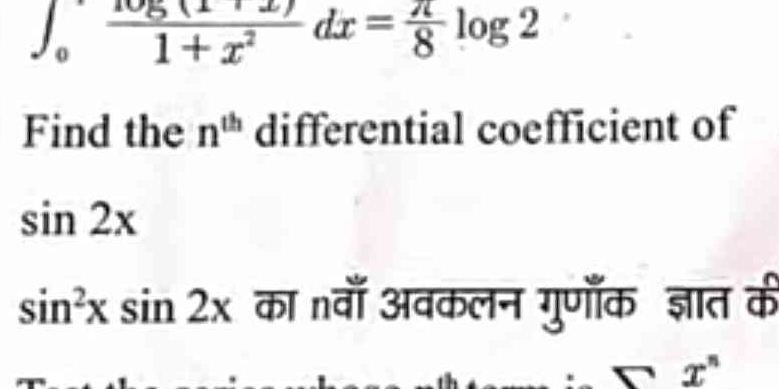Find the nth differential coefficient of sin 2x. Test the series whose nth term is Σx^n.

Understand the Problem
The question is asking to find the nth differential coefficient of the function sin(2x), as well as to test a series where the nth term is represented as Σx^n. This involves understanding derivatives and series expansion in calculus.
Answer
The nth differential coefficient of $\sin(2x)$ is $$ f^{(n)}(x) = 2^n \begin{cases} \sin(2x) & n \equiv 0 \mod 4 \\ \cos(2x) & n \equiv 1 \mod 4 \\ -\sin(2x) & n \equiv 2 \mod 4 \\ -\cos(2x) & n \equiv 3 \mod 4 \end{cases} $$ and the series $\Sigma x^n$ converges to $$ S = \frac{1}{1 - x} \quad \text{for } |x| < 1. $$
Answer for screen readers
The nth differential coefficient of $\sin(2x)$ is:
$$ f^{(n)}(x) = 2^n \begin{cases} \sin(2x) & n \equiv 0 \mod 4 \ \cos(2x) & n \equiv 1 \mod 4 \ -\sin(2x) & n \equiv 2 \mod 4 \ -\cos(2x) & n \equiv 3 \mod 4 \end{cases} $$
The series $\Sigma x^n$ converges to:
$$ S = \frac{1}{1 - x} \quad \text{for } |x| < 1 $$
Steps to Solve
- Differentiate sin(2x)
To find the nth differential coefficient of the function $f(x) = \sin(2x)$, we use the chain rule. The first derivative is given by: $$ f'(x) = \frac{d}{dx} (\sin(2x)) = 2 \cos(2x) $$
- Find subsequent derivatives
We continue differentiating to find a pattern:
-
Second derivative: $$ f''(x) = \frac{d}{dx}(2 \cos(2x)) = -4 \sin(2x) $$
-
Third derivative: $$ f'''(x) = \frac{d}{dx}(-4 \sin(2x)) = -8 \cos(2x) $$
-
Fourth derivative: $$ f^{(4)}(x) = \frac{d}{dx}(-8 \cos(2x)) = 16 \sin(2x) $$
- Identify the pattern
From the derivatives, we observe the following pattern:
- The nth derivative alternates between sine and cosine and has powers of 2: $$ f^{(n)}(x) = 2^n \begin{cases} \sin(2x) & \text{if } n \equiv 0 \mod 4 \ \cos(2x) & \text{if } n \equiv 1 \mod 4 \ -\sin(2x) & \text{if } n \equiv 2 \mod 4 \ -\cos(2x) & \text{if } n \equiv 3 \mod 4 \end{cases} $$
- Testing the series Σx^n
The series defined by the nth term $\Sigma x^n$ is a geometric series. The sum of an infinite geometric series can be expressed as: $$ S = \frac{a}{1 - r} $$ where $a$ is the first term and $r$ is the common ratio, provided $|r| < 1$. Here $a = x^0 = 1$ and $r = x$, yielding: $$ S = \frac{1}{1 - x} $$
The nth differential coefficient of $\sin(2x)$ is:
$$ f^{(n)}(x) = 2^n \begin{cases} \sin(2x) & n \equiv 0 \mod 4 \ \cos(2x) & n \equiv 1 \mod 4 \ -\sin(2x) & n \equiv 2 \mod 4 \ -\cos(2x) & n \equiv 3 \mod 4 \end{cases} $$
The series $\Sigma x^n$ converges to:
$$ S = \frac{1}{1 - x} \quad \text{for } |x| < 1 $$
More Information
The nth derivative of the sine function reveals periodic behavior due to the properties of trigonometric functions. The geometric series $\Sigma x^n$ converges for values of $x$ within the unit circle, reflecting a fundamental concept in analysis.
Tips
- Not using the chain rule correctly while differentiating functions like $\sin(2x)$ can lead to incorrect derivatives.
- Forgetting the conditions under which geometric series converge can lead to misinterpretation of their sums.
AI-generated content may contain errors. Please verify critical information